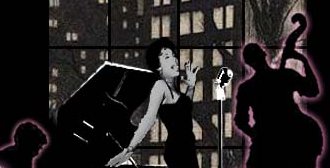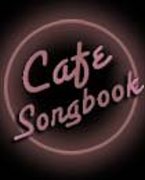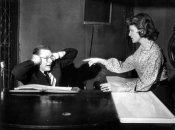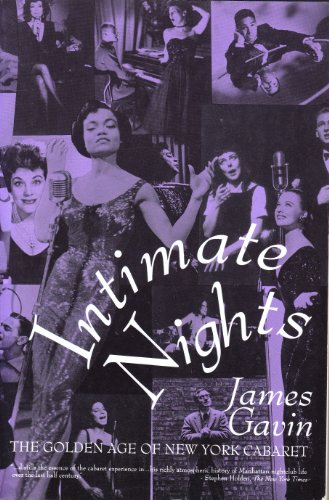Welcome toCafe SongbookInternet Home of the |
 |
 |
| Home || Songs || Songwriters || Performers || Articles and Blogs || Glossary || About Cafe Songbook || Contact/Submit Comment | |
| Search Tips: 1) Click "Find on This Page" button to activate page search box. 2) When searching for a name (e.g. a songwriter), enter last name only. 3) When searching for a song title on the catalog page, omit an initial "The" or "A". 4) more search tips. | |
Spring Can Really Hang You Up the Most |
|||
Written: 1955 |
Music by: Tommy Wolf |
Words by: Fran Landesman |
Written for: Independent Publication |
| Page Menu | |||
| Main Stage || Record/Video Cabinet || Reading Room || Posted Comments || Credits | |||
On the Main Stage at Cafe Songbook | ||
|
|
Irene Kralperforming "Spring Can Really
|
|
| Amazon |
More Performances of
"Spring Can Really Hang You Up the Most"
in the Cafe Songbook Record/Video Cabinet
including another by Getz.
video before starting another.)
Stan Getz (tenor sax)
Albert Dailey (piano)
performing
"Spring Can Really
Hang You Up the Most"
recorded Irvington, New York
January 12, 1983 for the album Poetry
| Amazon |
More Performances of
"Spring Can Really Hang You Up the Most"
in the Cafe Songbook Record/Video Cabinet
(Video credit)
Cafe Songbook Reading Room"Spring Can Really Hang You Up the Most" |
|||||
| About the Origins of the Song | |||||
Bob Dorough co-wrote many songs with Fran Landesman and "the results were a finely tuned balance of her acidic, edgy wit" and their ability to fashion hip lyrics. His uniquely eccentric vocal style fit them to a "T." |
Given that lyricists of The Great American Songbook are often inclined to include irony in their work, it is not surprising that spring as used in their songs is often linked to pain rather than to the sweetness, joy and light more commonly associated with that season. Richard Rodger's two most celebrated lyricists both employ an irony related to spring. In his lyric for "Spring Is Here," Lorenz Hart gets rattled because even though spring has arrived his heart is not dancing and the breeze does not delight him. In the song's verse he writes, "Now April, May and June / Are sadly out of tune." And Oscar Hammerstein in his lyric for "It Might as Well Be Spring" also finds himself discombobulated by having feelings he has always associated with spring when "it isn't even spring." Fran Landesman's attention was piqued by an irony of spring in T. S. Eliot's prototypical modernist poem "The Wasteland" of 1921, which was virtually required reading for all liberal arts students of the mid twentieth century. Eliot's poem begins with the painfully ironic statement, "April is the cruellest month"; and Landesman having grown up in the shadow of that poem, and her life as a poet and lyricist having begun during the Beat period of the 1950's found herself challenged by a desire to express Eliot's irony in the "hip" language of her own era -- and came up with "Spring Can Really Hang You Up the Most." In the early 1950s Fran had moved with her husband Adam Landesman from New York to St. Louis where their lives became immersed in Adam's newly founded club The Crystal Palace, a very hip spot in Gaslight Square. As the story goes, Fran, while sitting at the club's bar listening to jazz pianist Tommy Wolf play,* decided to show him her new poem. Wolf, undoubtedly recognizing how "hip" the poem was, set it to music. Not long afterwards, among the many famous and very "hip" people who visited the club was jazz pianist George Shearing who heard Wolf and Landesman perform the song and liked it so much that he taped it and brought it back to New York. There he showed it to the very "hip" young performers Jackie and Roy (Jackie Cain and Roy Kral) who in 1955 recorded it and put it on their very first album, Storyville Presents Jackie and Roy (See a and listen at right.). The rest, as they say, is history: "Spring Can Really Hang You Up the Most" became a first class jazz standard recorded by all those "hip" singers and musicians listed in the right column on this page as well as many more. One of them, Irene Kral, younger sister of Roy Kral (of Jackie and Roy) recorded it in 1974 -- a peerless version of great beauty featured on the Cafe Songbook Main Stage above.
|
||||
| back to top of page | |||||
| Critics Corner | |||||
 Ted Gioia The Jazz Standards: A Guide to the Repertoire New York: Oxford University Press, 2012. |
Ted Gioia considers Tommy Wolfe to be"an exceptional songwriter. . . . one of the most talented of his generation." Gioia continues, "Wolf benefited enormously from the contributions of lyricist Fran Landesman who wrote the words for his best songs. ' For "Spring Can Really Hang You Up the Most," Wolf responded to Landesman's words by creating "a poignant melody that gave emotional depth to Landesman's arch lyrics." Gioia continues, "There is much to admire here, with both the main theme and the bridge sustaining the poignancy of the piece; but I especially like Wolf's clever alteration of the final restatement of the A theme, which briefly hints at a modulation down a fifth before retuning to the tonic key." Gioia also comments:
|
||||
|
Jackie and Roy, who, in 1955 were the first to record "Spring Can Really Hang You Up the Most,"after they received the song from songwriters Wolf and Landesman via George Shearing, would have been likely to have performed it first in New York at the Blue Angel cabaret where they made their New York City debut in 1954. James Gavin writes of them that along with performing show tunes which were then the staple of their repertoire, "they took pride in introducing songs by such young writers as Tommy Wolf and Lyricist Fran Landesman, premiering that duo's 'Spring Can Really Hang You Up the Most,' the hippest torch song of the day." (Gavin, p. 152, Intimate Nights, Limelight paperback Ed.) |
||||
|
David Jenness and Don Velsey in their book Classic American Popular Songs state directly that they "spend time on this well known song because it is so beautifully made. . . . as fresh today as in the troubled 1950s." They assert that "Spring songs fall into two categories, the light-hearted, often silly ones and those speaking of the bittersweet disappointment of lost love." "Spring Can Really Hang You Up the Most" is for them unequivocally "of the latter genre." They point out various musical factors such as underlying chords that are often dark, the use of discord, "descending chains of thirds," and "a bridge that reinforces the downward feeling" all of which underpins the song's sadness. Still, they point out that the entire song is not without its lighter portions:
|
||||
| back to top of page | |||||
| Lyrics Lounge | |||||
Like the Bob Dorough album (above in this column), all lyrics are by
from a review of Ian Shaw album A Ghost in Every Bar by Amazon Reviewer dnd: See the "Comments" section just below for a version of the full lyric of "Spring Can Really Hang You Up the Most." |
The verse characterizes the singer as formerly "a sentimental thing," but Spring has converted her into a realist. In the past, she got seduced each Spring, "threw away her heart" every time that ever so romantic season arrived. But after many disappointments has forsaken unrealistic Spring for the harsh honesty of Winter: "Now a Spring romance / Hasn't got a chance, / Promised my first dance to Winter." The first refrain opens with a simile that reveals the speaker as paralyzed from her past experience with Spring so that just when she ought to be full of energy and ready to get into the race, she is "feeling like a horse that has never left the post." Spring has hung her up. Of all the sights and sounds of spring that ought to be motivating her, she says, in one of the songs poignant triads, "Head it before / And I know the score, /And I've decided that Spring is a bore!" The second refrain informs us through a bit of striking hyperbole that the effects of the season are universal: "Robins [are] building nests from coast to coast." So she tries to be robin-like herself, but it's a painful sham: "My heart tries to sing / So they won't hear it breaking. / Spring can really hang you up the most." As in the first refrain, she again reveals her paralysis, but now she never even gets to the starting line. By changing the venue for her metaphor from one in which she ventures out to the expansive racetrack that at least holds out a chance for victory, now all she can manage is a retreats to her claustrophobic closet: "But I'm on the shelf / With last year's Easter bonnets, / Spring can really Hang you up the most." Finally she tries the doctor for a cure. His phony prescription is a none too tasty tonic ("Sulphur and Molasses was the dose.") but it "didn't help a bit" because she realizes her condition is "chronic" and, of course, "Spring can really Hang you up the most."
|
||||
| back to top of page | |||||
Visitor CommentsSubmit comments on songs, songwriters, performers, etc.
Feel free to suggest an addition or correction. Please read our Comments Guidelines before making a submission. (Posting of comments is subject to the guidelines. Not all comments will be posted.) |
|
| To submit a comment, click here. | |
Posted Comments on "Spring Can Really Hang You Up the Most":
From: Pete Collins, posted 06/23/2018: The Lyrics Should be Posted! Too bad we can not get Fran's original lyrics. Below is taken from a number of different sung versions of this song, with the lyrics that make the most sense.
From: Pete Collins, posted 07/16/2018: Thank you for using my lyrics to this amazing song. Other versions I have seen on the net have words that don't completely make sense with the words around them. While I appreciate that Jackie and Roy were the first to record this song, your list of other performers omits what I consider to be the best single vocal version of this song. In 1957 June Christy recorded this song, with orchestration by Pete Rugolo, for Capitol Records. More than any other vocal version of this song, June captures the poignant, melancholy nature of multiple loves lost each spring. The song is most definitely a song sung by a woman, and June does it to a T. I was not the first to recognize that June had the best vocal version. Sid McCoy, the famous Jazz disc jockey in Chicago in the 1960's was the one who put me on the her version, which was the only version he played on his late night Jazz radio show during those years. Cafe Songbook respons 07/16/2018: Pete, Thanks for your comment. Leaving out the Christy version was certainly our "bad." It's a great recording made, according to our source, on August 15, 1958 and released on the 1959 album The Song is June. And here is the track:
From Pete Collins, posted 07/18/2018: Guess I can' keep still about this song -- that to my mind is not appreciated enough by the general public. Quite a few Jazz musicians have recorded it, but it still remains somewhat obscure to the listening public -- possibly because it is a seasonal song for late winter or early spring. Cafe Songbook responds 07/18/2018: A couple of things: First, thanks for calling attention to the Ella version. Her 1961 recording can be heard in the Cafe Songbook Record and Video Cabinet on this page, which should make it easy for people to compare and contrast Ella's and June's recordings. Also, it's worth mentioning a terminology issue. The term " verse" (click the preceding link for complete definition in the The Cafe Songbook Glossary.) as used by composers, lyricists, song publishers, etc. within the world of the Great American Songbook refers only to the introductory section of a song -- if it has a verse at all (e.g. the first five lines of "Spring Can Really Hang You Up the Most" is its verse.), whereas the other individual sections within a song are referred to as choruses or refrains. It can be confusing.
|
|
| back to top of page |
Credits("Spring Can Really Hang You Up the Most" page) |
Credits for Videomakers of videos used on this page:
Borrowed material (text): The sources of all quoted and paraphrased text are cited. Such content is used under the rules of fair use to further the educational objectives of CafeSongbook.com. CafeSongbook.com makes no claims to rights of any kind in this content or the sources from which it comes.
Borrowed material (images): Images of CD, DVD, book and similar product covers are used courtesy of either Amazon.com
Any other images that appear on CafeSongbook.com pages are either in the public domain or appear through the specific permission of their owners. Such permission will be acknowledged in this space on the page where the image is used.
For further information on Cafe Songbook policies with regard to the above matters, see our "About Cafe Songbook" page (link at top and bottom of every page). |
The Cafe Songbook
|
||
|
Performer/Recording Index
(*indicates accompanying music-video)
|
||
1955 Notes: The first recording of "Spring Can Really Hang You Up the Most" made in May, 1955 was released on a ten inch LP titled Storyville Presents Jackie and Roy. It included twelve tracks featuring vocals by Jackie Cain accompanied by Roy Kral, Piano; Red Mitchell. bass; Shelly Manne, drums; and Barney Kessel, guitar. The album is currently available on CD, MP3 and streaming under the title Spring Can Really Hang You Up the Most at Amazon. View reissue of original album at
(Please complete or pause one |
||
| back to top of page | ||
1960 (recorded)/'61 (released)
Notes: "This album, DOUBLE EXPOSURE, has the finest arrangements of any Chris Connor album I listened to as a kid. Maynard Ferguson remains restrained for his explosive style, and he and his orchestra support the lovely, cool, vocals. No one ever sang like Chris Connor, and SPRING CAN REALLY HANG YOU UP THE MOST is her ultimate performance." (From Amazon reviewer Keith Alan Deutsch). |
||
|
Notes: Recorded in New York City, 1961 originally on Riverside Records. Tracks include "Angel Eyes", a version of Horace Silver's "Doodlin'," and "Green Dolphin Street" featuring Bill Evans, Clark Terry, Urbie Green, Blue Mitchell and Wynton Kelly. The following from Amazon reviewer Professor: "This was a ground-breaking record when it was released (1961). At that point, Murphy was 29 years old and was already one of the best jazz singers in the world. The record companies originally tried to market him as a crooner, singing ballads and standards, which he did very well. Had he stayed with that kind of music, I'm sure he would have made more money. But he was a jazz singer to the core, and this record was the one that really established his direction. And he never looked back. |
||
1961
Notes: The original album cover has artwork by Jean Dubuffet. Ella is in fine form here backed by Lou Levy on piano, Herb Ellis on guitar, Joe Mondragon on bass, and Stan Levey on drums. Other notable tracks beside "Spring Can Really Hang You Up the Most" include "A Night in Tunisia," "You're My Thrill," "Jersey Bounce," and the title track "Clap Hands! Here Comes Charlie."
(Please complete or pause one |
||
| back to top of page | ||
1962
Notes: Sarah originally recorded "Spring Can Really Hang You Up the Most" for her mono LP album Snowbound (Roulette SR 52091) originally released in 1962. Don Costa was both arranger and conductor. The arrangements are on the lush side employing strings freely, and quite a few songs are best for when you are snowbound after your heart has been broken and you're still dwelling on what happened -- songs like "What's Good About Goodbye," "Glad To Be Unhappy," and "I Fall In Love Too Easily." The song featured above, "Spring Can Really Hang You Up the Most," doesn't make it sound as if the singer expects things to get much better after the snow melts. Despite all of this, it's a wonderful collection and we all need this kind of thing every once in a while. |
||
| back to top of page | ||
1963
Notes: In his book The Jazz Standards, Ted Gioia writes that "Spring Can Really Hang You Up the Most" "has been favored more by singers than instrumentalists, and clearly you don't get the full impact of the piece if you don't hear the words [by Fran Landesman]." But Gioia goes on to point out that Tommy Wolf's melody is definitely appealing enough to be heard on its own. This is especially so he suggests on versions by horn players who "have a taste for deep ballads." More specifically he cites two versions by Stan Getz, each of which is very different from the other: a full orchestra version on the track for the 1963 album Reflections (See the video just above.) and Goetz's "minimalist duet . . . with pianist Albert Dailey" from 20 years later -- 1983. Gioia notes, "both interpretations are essential recordings of this song." (Listen to the duet on the Cafe Songbook Main Stage above.)
(Please complete or pause one |
||
| back to top of page | ||
1964
Notes: The best account of Carmen McRae's album Bittersweet (and of her career at the point she made the album) is by James Gavin and can be read on his website. |
||
| back to top of page | ||
1968
Notes: Recorded in Paris in January, 1968 and released in that year in France on BYG Records, and then on Pye Records in the UK in 1969 as the album Key for Two featuring Hampton Hawes and Martial Solal (two African - Americans, one of them living permanently in France) on piano, Pierre Michelot on bass, and Kenny Clarke on drums. Tracks include Tunes: "Key For Two," "Stella By Starlight," "Spring Can Really Hang You Up The Most," "Bag's Groove," "Lover Come Back To Me," "Fly Me To The Moon," and others. Also released in 1979 on Affinity (catalog no. AFF 31; Vinyl LP) The following by Scott Yanow for Apple Music: |
||
| back to top of page | ||
1979
Notes: From iTunes commentary by Steve Huey: |
||
| back to top of page | ||
2001
Notes: Come Dream with Me, Monheit’s second album was released in 2001 when she was 23. The album is mostly standards but with a couple of jazz compositions stirred into the mix. Jane is accompanied by jazz pianist Kenny Barron on all tracks with the exception of the last, “A Case of You” on which the pianist is Richard Bona. |
||
| back to top of page | ||
2009
Notes: Recordings of Barbra Streisand singing "Spring Can Hang You Up the Most" began in 1962 when she performed the song on The Tonight Show. As the story goes Barbra had received the music for the song directly from lyricist Fran Landesman on a visit by the singer to St. Louis, Landesman's home base. No doubt Fran hoped that Barbra would like the song and perform it, and indeed that was the case. Streisand recordings of the song can be found on the multi-disk CD set Just For The Record (on which can be heard the 1962 television performance). Love is the Answer from 2009 was produced by Diana Krall who also accompanies Barbra on Piano. The arrangements are by Johnny Mandel. We recommend the Deluxe version of the album on which many of the songs are performed with full orchestra and, on separate tracks, with a quartet only. It is in the quartet versions, including 'Spring Can Really Hang You Up the Most," that Streisand's voice is more in focus and so her extraordinary interpretations more prominent. |
||
| back to top of page | ||
2011
Notes: |
||
| back to top of page | ||
2017
Notes: The Bill Charlap Trio consists of Bill Charlap (piano), Peter Washington (bass), and Kenny Washington (drums). |
||
| back to top of page |
| Home || Songs || Songwriters || Performers || Articles and Blogs || Glossary || About Cafe Songbook || Contact/Submit Comment | |
© 2009-2018 by CafeSongbook.com -- All Rights Reserved |







